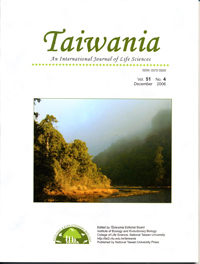Research Paper
Applicability of Non-Invasive Sampling in Population Genetic Study of Taiwanese Macaques (Macaca cyclopis)
Jui-Hua Chu, Yao-Sung Lin and Hai-Yin Wu
Published on: December 2006
Page: 258 - 265
DOI: 10.6165/tai.2006.51(4).258
Abstract
This paper presents a pilot study conducted to test the applicability of non-invasive sampling approach in population genetic studies of Taiwanese macaques (Macaca cyclopis). Monkey feces were collected in the field and used as non-invasive DNA sources. PCR success rates of both microsatellite and mitochondrial DNA markers were examined. When compared with other studies by non-invasive genetic sampling of different mammal species, success rate of microsatellite PCR amplification is low (42.4%, N = 181) while that of mtDNA PCR amplification is acceptable (66.5%, N = 334). The low PCR success rate and poor PCR repeatability of microsatellite alleles due to allelic dropout and false alleles make it difficult to obtain a reliable microsatellite data set. However, the difficulties may be overcome by new techniques.
中文摘要
本文為檢驗非侵略性採樣法在臺灣獼猴族群遺傳研究應用性的前導實驗。本研究採 集獼猴排遺樣本作為非侵略性之DNA 樣本來源,並利用微隨體及粒線體DNA 兩種分 子標幟檢驗其PCR 成功率。在與其他哺乳動物非侵略性遺傳研究的比較後發現,臺灣 獼猴的微隨體PCR 成功率較低(42.4%, N = 181),而粒線體DNA 的PCR 成功率則尚 可接受(66.5%,N = 334)。微隨體對偶基因的低PCR 成功率及低可重複性(即高對偶 基因遺失率及高假性對偶基因出現率),使得可靠的微隨體資料庫難以建立。然而,日 新月異的實驗技術也許能克服以上的實驗困境。
Keyword: Macaca cyclopis, Non-invasive sampling, Microsatellite, mtDNA d-loop.


